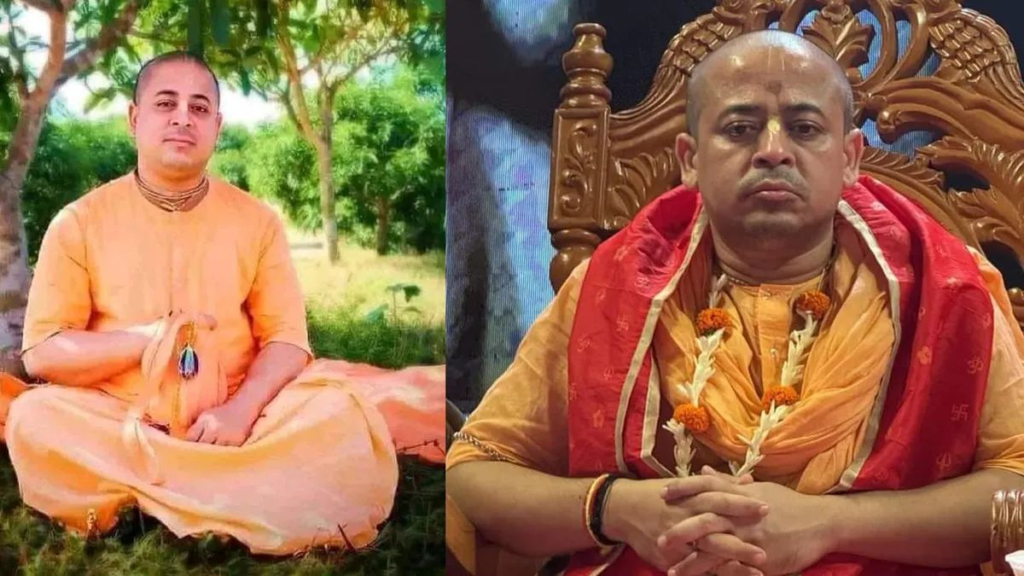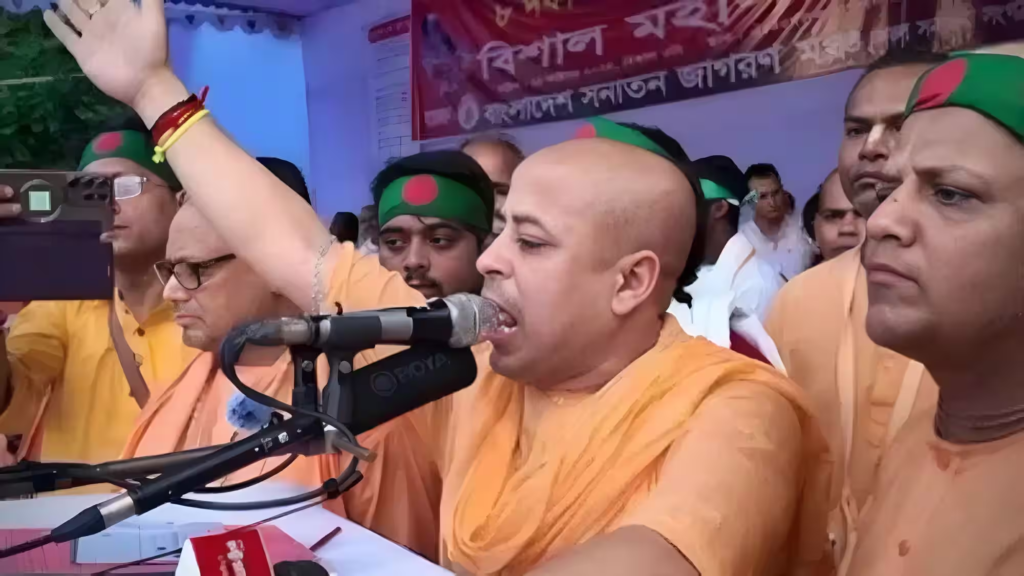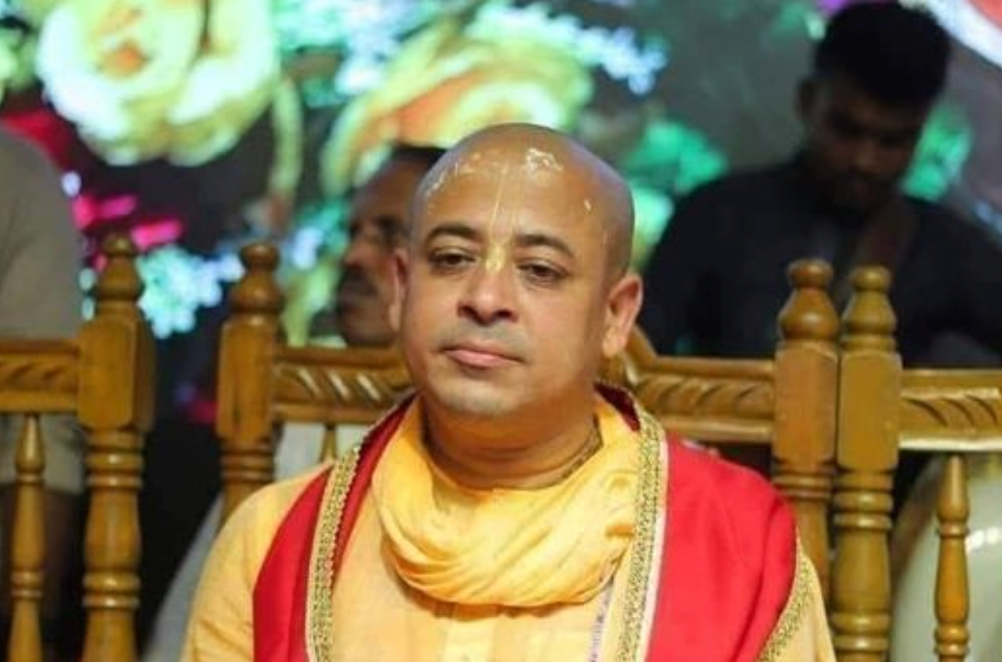The arrest of Chinmoy Krishna Das Brahmachari, a prominent ISKCON monk and Hindu minority leader in Bangladesh, has ignited widespread concern and protests.
This incident, occurring amid rising tensions and violence against minority communities, raises critical questions about religious freedom, political stability, and the protection of minority rights in Bangladesh.
As the country navigates a period of intense political turmoil following the ouster of former Prime Minister Sheikh Hasina, the arrest of a figure like Brahmachari underscores deeper societal and political challenges.
The Arrest and Its Immediate Impact
Chinmoy Krishna Das Brahmachari was detained earlier this week at Dhaka Airport by the Detective Branch of the Dhaka police. Reports indicate that he was taken to an undisclosed location, and no official statement has been released by Bangladeshi authorities regarding the reasons for his arrest.
However, sources suggest that a sedition case filed against him earlier this month may be linked to his outspoken stance against violence targeting the Hindu minority in Bangladesh.
The news of his arrest quickly spread, leading to strong reactions both domestically and internationally. In Rangpur, approximately 300 km north of Dhaka, the Hindu community organized protests demanding stronger legal protections for minorities and the establishment of a dedicated ministry for minority affairs.
This protest is part of a broader movement seeking to address the persistent discrimination and violence faced by religious minorities in Bangladesh, where Hindus make up about 8% of the population.
Read : Hindu and Sikhs Protest Outside Canadian Mission Against Temple Attack: Watch
Internationally, voices like Radharamn Das, an ISKCON spokesperson, and Indian political leaders such as Suvendu Adhikari have called attention to the incident. They have urged the Indian government, including External Affairs Minister S. Jaishankar, to intervene and ensure Brahmachari’s safety.
I just received the shocking news that Chinmoy Krishna Das Brahmachari, a Hindu monk & the face and leader of Bangladeshi minorities in this difficult times, has been arrested by the Dhaka police and taken to an undisclosed location. Kind attention @ihcdhaka @DrSJaishankar… pic.twitter.com/J9MszoBUvy
— Radharamn Das राधारमण दास (@RadharamnDas) November 25, 2024
Adhikari described Brahmachari as a “firebrand leader” fighting for the survival and dignity of Hindu minorities, warning of potential dangers under the current Bangladeshi regime.
Rising Tensions and Minority Rights in Bangladesh
The arrest of Brahmachari comes at a time of heightened tensions in Bangladesh, particularly for religious minorities. The ouster of Sheikh Hasina’s government has created a power vacuum, leading to increased political violence and social unrest. The interim government, led by Mohammed Yunus and backed by the military, has faced criticism for failing to protect minority communities from targeted attacks.
In recent months, there have been numerous reports of violence against Hindus, including vandalism of businesses, homes, and temples. These incidents have fueled fears within the minority community and have led to calls for more robust legal protections.
Earlier this month, sedition charges were filed against 19 individuals who participated in a minority rights rally in Chittagong, further highlighting the challenges faced by those advocating for minority rights.

The situation has been exacerbated by a perceived lack of commitment from the current government to address these issues. While Mohammed Yunus has pointed to security measures during major Hindu festivals like Durga Puja as evidence of his government’s efforts, many activists argue that these measures are insufficient. They point to the ongoing violence and the lack of accountability for those responsible as indicators of deeper systemic issues.
The Broader Implications for Religious Freedom and Democracy
The arrest of Chinmoy Krishna Das Brahmachari raises broader questions about religious freedom and democracy in Bangladesh. As a prominent leader of the Hindu minority, Brahmachari has been a vocal advocate for the rights and protection of his community. His arrest is seen by many as an attempt to silence dissent and suppress efforts to highlight the plight of religious minorities.
This incident also reflects the challenges facing Bangladesh’s democratic institutions. The interim government has announced plans to unveil an election roadmap and promised reforms to the electoral system.
However, critics remain skeptical of these promises, particularly given the reports of targeted attacks and the suppression of minority voices. The arrest of Brahmachari and the broader crackdown on minority rights advocates suggest that the path to genuine democratic reform may be fraught with obstacles.
For the international community, the situation in Bangladesh serves as a reminder of the importance of protecting religious freedom and minority rights.

Countries like India, which have close cultural and historical ties to Bangladesh, have a role to play in advocating for these values. The calls from Indian leaders for intervention highlight the need for diplomatic efforts to address the underlying issues and ensure the safety of minority communities.
The arrest of Chinmoy Krishna Das Brahmachari at Dhaka Airport has brought renewed attention to the challenges facing religious minorities in Bangladesh.
It underscores the need for stronger legal protections, greater accountability, and a genuine commitment to democratic values. The protests in Rangpur and the international outcry reflect the deep concern within the Hindu community and beyond about the erosion of minority rights and the potential for further violence.
As Bangladesh navigates this turbulent period, the international community must remain vigilant and engaged. Ensuring the safety and dignity of all citizens, regardless of their religious or ethnic background, is essential for the country’s stability and progress. The case of Brahmachari is not just about one individual; it is about the broader struggle for justice, equality, and human rights in Bangladesh.

